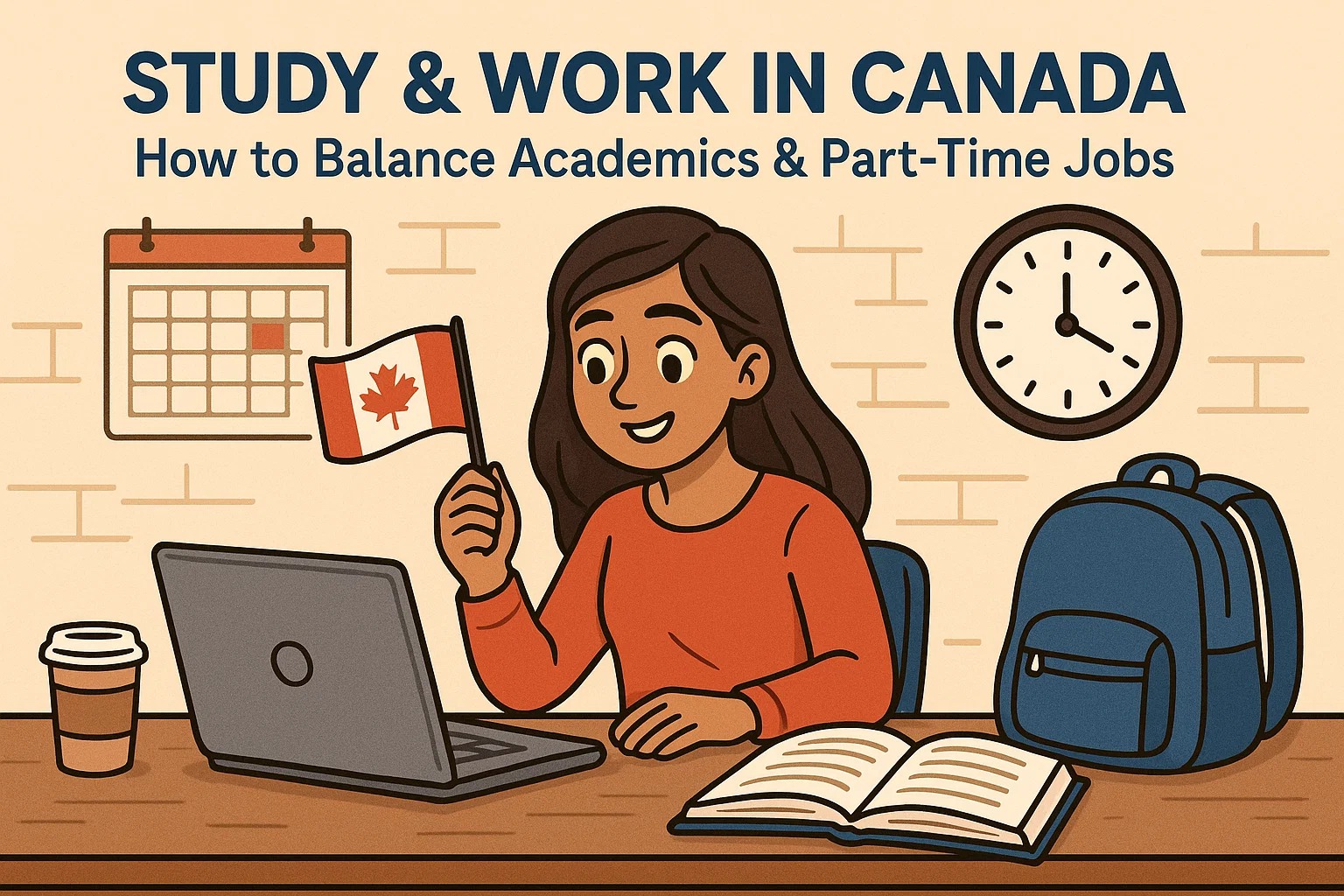Studying abroad in Canada can be exciting, yet it can also have challenges for many international students. Canada has world-class education, multicultural campuses, and has provided many opportunities for personal and professional growth. Nonetheless, as tuition fees and living conditions continue rising, striking a balance between study and work is important for most students.
Looking back on my college life in Canada, I learned many valuable life skills simply by balancing full-time studies with part-time work experiences. This taught me important concepts such as time management, financial discipline, and being adaptable to new circumstances. It can also help students create a path for their career and gain relevant workplace experience helpful for the future. This article will help you explore ways to maintain balance and work while leaving the experience open for you as an international student studying in one of the best higher education destinations- Canada.
Understanding Student Life and Work Opportunities in Canada
Canada is among the leading choices for students worldwide. The combination of a safe environment, quality education and flexible visa conditions has made Canada the logical choice for students wishing to study abroad in Canada and receive global exposure.
1.The Basics of Working While Studying
International students can work 20 hours a week while studying and full-time during breaks. Students do not need another work permit if they have a valid study visa, and their background meets the government criteria. More information can be found on Canada's official website about working while studying here.
2.Common Part-Time Job Options
| Type of Job | Average Salary (CAD/hour) | Flexibility |
|---|---|---|
| On-campus assistant | 15-20 | High |
| Retail associate | 14-18 | Medium |
| Cafe/barista work | 13-17 | Medium |
| Tutor or peer mentor | 18-25 | High |
| Internship (related to courses) | 20-25 | Variable |
These jobs not only support living costs but also enhance interpersonal and career skills.
For more detailed guidance, you can check out this guide on working while studying in Canada.
Suggestions to Successfully Balance Study and Work
Balancing study and concurrent work can be complicated but is entirely doable once one implements follow-through strategies.
1.Plan Ahead
➣Use a planner or online calendar to layout class schedules, assignments, and work commitments.
➣Avoid scheduling work commitments immediately before an exam period.
➣Keep at least one weekend open to work on assignments or for your downtime.
2.Work in a Related Field
Pick jobs which support your college schedule, or future career goals. For example, if you are taking hospitality courses, working in a cafe or restaurant may give you relevant experience.
Read this article on becoming an experimental physicist to learn more about how academic paths relate to job opportunities.
3.Be Organized
➣Write out a to-do list for the week.
➣Make deadlines for assignments/projects.
➣Keep important documents (i.e., visa documents or job contracts) stored in a safe place.
4.Know Your Rights and Laws of Employment
Knowing Canada’s labor laws can help you ask for fair pay and rights in the workplace. For example, if you are working off-campus, rules can be checked for your employment at this official website.
Managing Finances and Lifestyle
1.Understanding the Cost of Studying in Canada
The cost of studying in Canada varies depending on your university, city, and lifestyle.
Here’s a quick overview:
| Expense Type | Average Cost per Year (CAD) |
|---|---|
| Tuition Fees | 15,000–25,000 |
| Accommodation | 8,000–12,000 |
| Food & Transportation | 3,000–5,000 |
| Miscellaneous | 2,000–3,000 |
Working part-time helps cover some of these costs while building financial independence.
2.Investigating Leading Canadian Colleges
If you are going to study abroad in Canada, you may want to consider studying at one of the leading Canadian colleges, like:
➣University of Toronto
➣McGill University
➣University of British Columbia
➣University of Waterloo
➣Western University
The colleges have flexible courses, part-time jobs on the campus, and career services.
You may even evaluate and compare what studying in another location would look like, such as reviewing the analysis of studying abroad in Germany vs UK in 2025.
Making a Career Path
Working while studying can help you feel career ready. You will gain transferrable skills like communication, collaboration, and time management.
If you want to pursue a career in technology or artificial intelligence, for example, read the list of top employers who will seek prompt engineers in 2025 to consider where the jobs will be.
You may also want to review the student experience or life abroad (like studying in New Zealand in the academic culture) to broaden your worldwide view before applying to study at a Canadian university.
Frequently Asked Questions
Q1. Is it possible to maintain my full-time job while enrolled in school in Canada?
Ans. It is doable but may be tricky. If you want to work while in school, look for online courses or courses that have a flexible schedule. Workplaces may also have employees who share reduced-hour contracts so you can work while enrolled in higher education.
Q2. How do I get a part-time job in Canada while enrolled in college?
Ans. You can apply for part-time employment opportunities through your university's career center, websites like Indeed.com, or by walking into shops where you can ask if they are hiring. Ensure that your visa status allows you to work off-campus and that your college program meets the requirements for working.
Q3. How do students balance part-time jobs and full-time studies?
Ans. Learn to plan ahead, avoid work overload, and stay focused on your studies. Additionally, the majority of universities in Canada have academic advisors that help you combine work/study time.
Q4. What is the average salary for part-time jobs in Canada?
Ans. Relatively, it depends on the job, the pay is anywhere between CAD 13-25/hour. Even though specialized employment, such as tutoring or internships, has the potential for more money.
Q5. Am I able to work full-time after I complete my studies while in Canada?
Ans. You can apply for a Post-graduation Work permit (PGWP) and be able to work in Canada up to three years after graduation.

